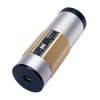Extech 407750 Sound Level Meter with PC Interface
The Extech Sound Level Meter with PC Interface features a background sound absorber for machine noise measurements.
Features
- Auto/manual ranging from 30 to 130dB in 6 ranges
- Background noise absorber mode filters ambient noise
- RS-232 interface for capturing data directly on a PC
- Free ground shipping
- Expedited repair and warranty service
- Lifetime technical support
- More
The Extech Sound Level Meter has a background sound absorber mode for machine noise measurements that filters ambient noise. It can easily interface with a PC to capture data directly via the optional Windows compatible software. Its high-accuracy specification allows the unit to meet type 2 standards (ANSI S1.4-1983, IEC 60651, EN 60651). An electret condenser microphone provides high-accuracy measurements. Live readings can be read clearly on the large display with backlighting and analog bargraph. The meter has 6 auto or manual ranges from 30 to 130dB.
- Digital display: 3-1/2 digit (1999 count) autorange LCD
- Bargraph display: 50dB display range (1dB resolution);
- Measurement range: 30 to 130dB (35 to 130dB for C weighting)
- Resolution: 0.1dB
- Accuracy: +/-1.5 dB @ 94dB for a 1kHz sine wave
- Microphone: electret condensor .24"(6mm dia.) type
- Frequency weighting: A and C type
- Time response: slow/fast
- Sampling time: updates every 0.5seconds
- Measurement frequency range: 31.5Hz to 8KHz
- Analog output: AC: 0.707Vrms (full scale); DC: 10mVDC/dB
- Applicable standards: IEC 651 Type 2, ANSI S1.4 Type 2
- Power Supply: 9V battery , optional AC adaptor
- Dimensions: 10 x 3.1 x 1.5"(256 x 80 x 38mm)
- Weight: 8.5oz. (240g)
- (1) Sound level meter
- (1) 9V battery
- (1) Case
In The News
From Paddles to Phytoplankton: Studying Vermont’s Wildest Lakes
For six months of the year, Rachel Cray, a third-year PhD student at the Vermont Limnology Laboratory at the University of Vermont, lives between a microscope and her laptop, running data. For the other six months, she is hiking and canoeing four of Vermont’s lakes, collecting bi-weekly water samples. Cray studies algal phenology across four lakes in Vermont, US, that have low anthropogenic stress—or in other words, are very remote. Funded by the National Science Foundation Career Award to Dr. Mindy Morales, the lakes Cray researches part of the Vermont Sentinel Lakes Program, which studies 13 lakes in the area and, in turn, feeds into the Regional Monitoring Network, which operates in the Northeast and Midwest US.
Read MoreReimagining Water Filtration: How Monitoring and Science Enhance FloWater Filtration Systems
Over 50% of Americans think their tap water is unsafe , according to the Environmental Working Group (EWG). Other recent surveys have found that number to be as high as 70% of persons surveyed. Whether due to increased public awareness of water quality issues or confusion about how municipal water sources are regulated, there is a clear distrust of tap water in the United States. According to industry expert Rich Razgaitis, CEO and co-founder of the water purification company FloWater, this issue creates a damaging cycle. Razgaitis explained that the health and environmental problems associated with contaminated water aren’t the only issues. As people become increasingly aware that some tap water is unsafe, they resort to bottled water.
Read MoreMonitoring New Hampshire’s Aquatic Ecosystems: Continuous Data Collection in the Lamprey River Watershed
New Hampshire’s aquatic ecosystems provide a range of ecosystem services to the state and region. Resources and services like clean water, carbon storage, climate regulation, nutrient regulation, and opportunities for recreation all depend on New Hampshire’s aquatic ecosystems remaining healthy. Jody Potter, an analytical instrumentation scientist at the University of New Hampshire (UNH), is studying these aquatic ecosystems in hopes of developing an improved understanding of ecosystem services and their interactions with climate change, climate variability, and land use changes. [caption id="attachment_39799" align="alignnone" width="940"] Aquatic sensors in the Merrimack River in Bedford, NH, with I-293 in the background.
Read More









